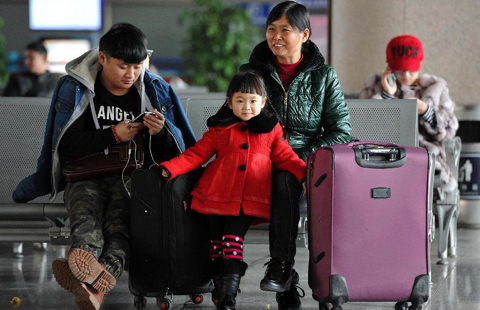Trade-related services set to be expanded
Updated: 2015-02-04 07:39
By Zhong nan(China Daily)
|
||||||||
CCPIT to set up specialized agencies to help Chinese companies as they venture abroad
The China Council for the Promotion of International Trade said on Tuesday that it will establish 50 business and legal service agencies this year, in a bid to give Chinese companies an edge over others competing for legal and certification expertise in the global market.
Yu Xiaodong, spokesman for the CCPIT, said these agencies will be categorized as legal, mediation and certification centers throughout China this year to assist Chinese companies' global expansion from a local base.
The council will set up trade arbitration agencies in provinces such as Zhejiang, Jiangsu, Shandong and Hubei, as well as in the China (Shanghai) Pilot Free Trade Zone.
The service scope of average adjustment will also be enlarged in China's coastal provinces to work on general cases of ships and cargo, damage of cargo, ship value assessment and mechanical casualty accidents.
"Chinese exporters and manufacturers are facing possible operational and legal risks in both developed and developing markets as many countries started to curb the import of Chinese products to narrow trade deficits, in particular under the current global economic setting," said Yu.
With 39.6 billion yuan ($6.3 billion) involved, the arbitration body of CCPIT accepted 1,729 cases regarding trade, investment and legal issues at home and abroad last year, up 38 percent from a year earlier.
"Under such circumstances, they need more legal assistance and equal treatment in the fields of international commercial and maritime business, as well as specialized arbitration agencies to protect their interests in overseas markets," Yu said.
The main task in international economic and trade arbitration involves accepting international and domestic cases related to individuals and organizations, offering dispute resolution services in accordance with the agreement of the parties and accepting cases on the authorization of domestic and foreign governments and international organizations.
All these new agencies and centers will be managed by the council to ensure its service quality. To optimize work efficiency, they will cooperate on legal claims, including loss assessment, settlement, judicial expertise, arbitration and trial for maritime cases to improve Chinese companies' ability in dealing with foreign clients or authorities.
Sang Baichuan, director of the institute of international business at the University of International Business and Economics in Beijing, said the new agencies and legal, certification and mediation centers will not only benefit the country's exporters but also the development of the China (Shanghai) Pilot Free Trade Zone, the Silk Road Economic Belt, the 21st Century Maritime Silk Road and various regional economies.
"Because many small and medium-sized enterprises lack legal knowledge of foreign markets, they usually don't respond to the summons of foreign arbitration courts or agencies after they are sued," Sang said. "The direct consequence for them is to bear the financial burden and this could make them weak while competing in the overseas markets."

 Hey, baby, you are my superhero
Hey, baby, you are my superhero
 Massive porcelain finds on Nanhai One
Massive porcelain finds on Nanhai One
 Little 'migrant birds' back home for Spring Festival
Little 'migrant birds' back home for Spring Festival
 Drill in snowfield tests the combat level of PLA
Drill in snowfield tests the combat level of PLA
 Katy Perry's halftime show wows Super Bowl viewers
Katy Perry's halftime show wows Super Bowl viewers
 New England Patriots win 49th NFL Super Bowl
New England Patriots win 49th NFL Super Bowl
 China weekly photos
China weekly photos
 Venice welcomes carnival season
Venice welcomes carnival season
Most Viewed
Editor's Picks

|

|

|

|

|

|
Today's Top News
China: UN presidency will be 'fair, open, transparent'
US taking 'fresh look' at weapons for Ukraine
Chinese insurer gets Waldorf OK
Farm goals may boost exports from US: experts
Dalai Lama meeting bad 'in any form'
Chinese make record number of NYC trips
GDP: How far can it fall?
Indian PM expected to visit President Xi's hometown
US Weekly

|

|







